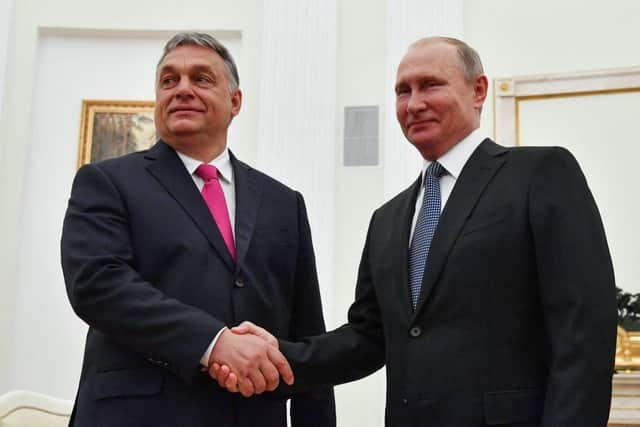Scotsman Letters: Is this the end for Ukraine?
There is no doubt Russia has the upper hand as the Ukraine army rations use of its dwindling munitions. This is more a changing balance of power in Europe rather than a “victory for all of Europe” as President Zelensky hailed the start of talks for Ukrainian EU membership.
As media attention moved to the war in Gaza and huge quantities of US military aid diverted to Israel, Western leaders have taken their eye of the ball, giving Putin more leverage to make military gains.
Advertisement
Hide AdAdvertisement
Hide AdGiven the added distraction of a US election next year there is no doubt that Putin feels he just has to hold his nerve and push forward in the Spring to push on to Odessa and Kyiv.


At his press conference last week Putin claimed “Odessa is a Russian city”. His confidence will only grow if Donald Trump wins the election given his praise for Trump’s stance on ending the war.
It’s difficult to see a way forward for Ukraine unless military aid is supplied in significant quantities soon. As Russian positions are entrenched, Ukraine needs to gain air superiority if it’s to make any significant gains. With a pro-Putin government also in Slovakia and an increasingly vocal pro-Russian opposition in Poland and Moldova, Putin may eventually regain huge areas of the former Warsaw Pact without bloodshed. Fear is proving a successful weapon of control and it’s starting to look ominous for Ukraine and Eastern Europe.
Neil Anderson, Edinburgh
Nuclear is safe
I made extensive use of radioactive isotopes made in nuclear reactors in my virological research. This was a stimulus to spend much time investigating their safety and possible environmental risks, visiting several nuclear reactors as well as decommissioning and waste storage sites in Scotland and England.
What I found causes me to disagree wholeheartedly with the comments made by Neil Gray, the energy secretary, (quoted by Alistair Grant, “Nuclear industry trade body accuses SNP minister of spreading ‘falsehoods’,” December 15) that nuclear power is "not safe".
As an Aberdonian by domicile, I know that memories of Piper Alpha are still fresh. Its death toll in one evening far exceeded the number of all those killed in all nuclear reactor accidents world-wide since Sellafield in 1957.
Nuclear power has made enormous amounts of electricity without generating greenhouse gases. It is a proven technology, unlike hydrogen or carbon capture. Turning tidal and wave power into electricity on any scale has eluded their proponents.
I fear that when the wind doesn't blow, the current Scottish Government policy of eschewing new nuclear means that in years to come the only way to keep the lights on, hospitals operational and IT systems working will be to import electricity generated by nuclear power south of the Border.
Hugh Pennington, Aberdeen
Too many elections
Advertisement
Hide AdAdvertisement
Hide AdAn interesting idea from Doug Clark (Letters, December 14). I would agree that current electoral practices are deeply flawed. A party can get 40 per cent of the votes cast nationwide and end up with 70 per cent of the seats in the House of Commons. Or, on the other hand, get millions of votes and not a single seat.
However, I do not think abolishing the parties is feasible or the answer. In earlier centuries the knights of the shires and the burgesses in the towns could choose from among their number someone they knew to some degree to represent them at the brief and infrequent parliaments. The great mass of the population, of course, had no representation.
With the expansion of the franchise the voters could not have any knowledge of the candidates and the parties evolved to represent broad groupings who could put forward a programme and voters made their choice on what party and programme the candidates supported.
The problems don’t arise with this arrangement but with there being not one election for the whole country but 650 separate elections. It is not the parties we should be seeking to dispense with but the constituencies. Each party would then put forward, as now, a programme and a putative prime minister and the number of the votes cast nationwide for each would decide the composition of the all-powerful Commons.
S. Beck, Edinburgh
Not proven
I was interested to read that the Scottish Solicitors Bar Association favoured retaining the Not Proven verdict.
I have been struck by the fact that supporters of its abolition seem to think that juries who were not quite certain of the accused's guilt would be more likely to convict were this option not available.
However, given that the advice to juries is often that if they be not absolutely sure of the accused's guilt then they must acquit, is it not more likely that, in the absence of Not Proven, juries would return a verdict of Not Guilty?
Jane Ann Liston, St Andrews
Strong medicine
On the BBC Sunday Show Martin Geissler pointed out to Finance Minister Shona Robison that prescriptions cost NHS Scotland £1.5bn, the same amount as the looming Budget shortfall.
Advertisement
Hide AdAdvertisement
Hide AdHe asked if it's time to means-test prescriptions as they do in England. England's population is 55m, Scotland's is one tenth of that, 5.4m. English system costs is £9.28b, so Scotland's would be around £900m. That's a saving of £600m off Ms Robison's Budget shortfall. Seems like a plan to me.
Allan Sutherland, Stonehaven
Write to The Scotsman
We welcome your thoughts – NO letters submitted elsewhere, please. Write to [email protected] including name, address and phone number – we won't print full details. Keep letters under 300 words, with no attachments, and avoid 'Letters to the Editor/Readers’ Letters' or similar in your subject line – be specific. If referring to an article, include date, page number and heading.
Comments
Want to join the conversation? Please or to comment on this article.